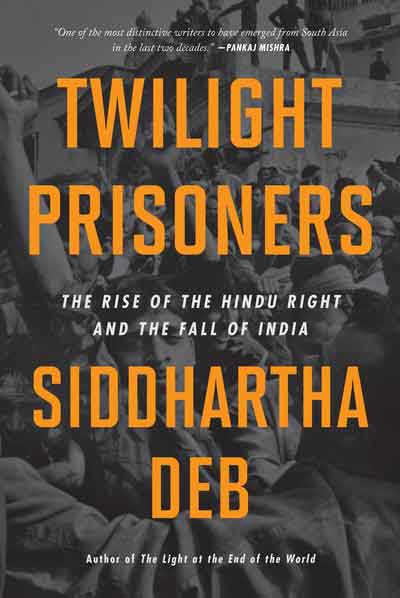Siddhartha Deb, Haymarket Books, forthcoming
I am an academic-manque, who made it only as far as a master’s in South Asian studies. My master’s thesis was about the rise of Hindutva in the US and, relatedly, about a particularly cussed habit of Indians in the diaspora to accuse others of being “non-Indian” if they didn’t follow particular religious and cultural principles or constant exert chest-thumping “patriotism.” I coined the term “Diasporic Insult” to suggest that such an accusation- that an Indian could be “non-Indian” based only on disagreement or non-conformism to Hindutva- was an insult only possible in the diaspora; after all, in India everyone is an Indian, by definition.

I thought it was a clever construct, but I was naïve. Though I knew Indians in India often invoked the foreign hand and that many Hindu Indians suggested that Muslims (and to a lesser degree Christians) were not “real” Indians, I had no idea how deep the idea ran and how damning the insult would become. The Diasporic Insult was also the Home Insult and being insulted at home can mean everything from harassment to murder. We are at the point of incipient fascism that evinces a genteel front abroad and strategically masks itself as a bulwark to China; as such, India, and its Prime Minister- with his l’etat c’est moi delusions- are lauded in the West.
Against the backdrop of 10 years of Modi rule and the absolute dominance of the BJP in the body politic (certainly in the North), Siddhartha Deb has written a blockbuster series of essays on the erosion of India and the rise of the Hindu Right. Both the virulence and the scale of the latter has eclipsed anything that has gone before in India; the assault appears to be across institutions, culture, and geography, ably abetted by a well-heeled diaspora that ironically flourishes in the (still) liberal West while egging on the destroyers of liberalism in India. Basic to this, as Deb points out in lapidary prose, is the utter degradation of India’s poor and minorities.
Deb’s oeuvre is remarkable and his analysis original. He doesn’t fit into the straight-jacket of the BJP narrative which holds that if you are against the party or its brand of Hindutva you are either a “Congresswalla” or “Anti-Indian.” Deb is equally mordant when discussing the (Congress) government reaction to the Bhopal massacre in 1984 as he is to discussing the open-season on journalists, a sine qua non of BJP Raj since 2014.
“Twilight Prisoners” is broken into three parts, each with three essays. The essays range from an analysis of Modi’s violence and rage to a critique of the Hindu Right’s delusions about ancient Indian science and technology. Notable in the book of nine excellent essays are a moving piece on Manipur and one on the assassination of Gauri Lankesh. Deb writes with an uncanny intelligence marked with a deep uneasiness about the state of Indian society. Modern fascism has a moving target of hate which in the Indian context oscillates between Muslims, “Western” elites, farmers, the urban poor, lower castes, or Indians in the Eastern provinces. The biggest target, though, is the Muslim community –that is being systematically disenfranchised. The recent inauguration of the Ayodhya Temple has made it clear: Modi’s India is to be a Hindu India, and everyone must pay unto it. Any resistance will be met with harassment, violence, murder, and the sheer brunt of constant calumny.
The last essay pays tribute to a timeless, eternal voice of reason and decency in India: Arundhati Roy. For years, as Deb notes, her’s and Pankaj Mishra’s were voices in the wilderness as it pertains to Western attention.
“Twilight Prisoners” is a short, easily readable book that packs a powerful punch. Likely due to its limited length, the book has one gap, though of course no author has the responsibility to include everything in a book. I’d have liked to see one essay on the amazing work being done on the ground to oppose the neo-liberal Hindutva onslaught and reference to the work of people like P. Sainath and Jaideep Hardikar. This is by no means a criticism of “Twilight Prisoners” but is, instead, a plea to live true to the powerful statement Deb makes at the end of his prologue: “As long as there is resistance and remembrance, there is still hope.”















































